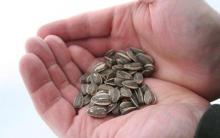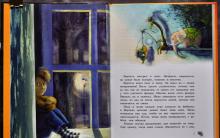Roman I.A. Goncharova “Oblomov” reveals the problem social society those times. In this work, the main characters were unable to deal with with your own feelings, depriving yourself of the right to happiness. We will talk about one of these heroines with an unfortunate fate.
The image and characterization of Olga Ilyinskaya with quotes in the novel “Oblomov” will help to fully reveal her difficult character and better understand this woman.
Olga's appearance
It seems difficult to call the young creature a beauty. The girl's appearance is far from ideals and generally accepted standards.
“Olga in the strict sense was not a beauty... But if she were turned into a statue, she would be a statue of grace and harmony.”
Being short, she managed to walk like a queen, with her head held high. There was a sense of character in the girl, of becoming. She didn't pretend to be better. She didn’t flirt, she didn’t ingratiate herself. She was as natural as possible in expressing emotions and feelings. Everything about her was real, without a drop of falsehood or lies.
“In a rare girl you will find such simplicity and natural freedom of look, word, action... no lies, no tinsel, no intent!”
Family
Olga was not raised by her parents, but by her aunt, who replaced her father and mother. The girl remembered her mother from a portrait hanging in the living room. She had no information about her father since he took her away from the estate at the age of five. Having become an orphan, the child was left to his own devices. The baby lacked support, care, kind words. The aunt had no time for her. She was too immersed in social life, and she did not care about the suffering of her niece.
Education
Despite her eternal busyness, the aunt was able to find time for the education of her growing niece. Olga was not one of those people who was forced to sit down for lessons with a whip. She always strived to gain new knowledge, constantly developing and moving forward in this direction. Books were an outlet, and music served as a source of inspiration. In addition to playing the piano, she sang beautifully. Her voice, despite its soft sound, was strong.
“From this pure, strong girlish voice, the heart beat, the nerves trembled, the eyes sparkled and swam with tears...”
Character
Oddly enough, she loved solitude. Noisy companies, cheerful gatherings with friends are not about Olga. She did not strive to acquire new acquaintances, revealing her soul to strangers. Some thought she was too smart, others, on the contrary, stupid.
“Some considered her to be narrow-minded, since wise maxims did not come out of her tongue...”
Not very talkative, she preferred to live in her shell. In that imaginary little world where it was good and calm. External calm was strikingly different from the internal state of the soul. The girl always knew clearly what she wanted from life and tried to implement her plans.
“If she has any intention, then things will boil over...”
First love or meeting Oblomov
My first love came at the age of 20. The meeting was planned. Stolz brought Oblomov to Olga’s aunt’s house. Hearing Oblomov’s angelic voice, he realized that he was lost. The feeling turned out to be mutual. From that moment on, meetings became regular. The young people became interested in each other and began to think about living together.
How love changes a person
Love can change any person. Olga was no exception. It was as if wings had grown behind her back from the overwhelming feelings. Everything in her was seething and seething with the desire to turn the world upside down, changing it, making it better, cleaner. Olga's chosen one was from a different field. Understanding the emotions and ambitions of your beloved is too difficult a task. It was difficult for him to resist this volcano of passions, sweeping away everything in its path. He wanted to see in her a quiet, calm woman who completely devoted herself to home and family. Olga, on the contrary, wanted to shake up Ilya, change him inner world and the usual way of life.
“She dreamed of how she would “order him to read the books” that Stolz left, then read newspapers every day and tell her the news, write letters to the village, complete a plan for organizing the estate, get ready to go abroad - in a word, he would not fall asleep with her; she will show him a goal, make him love again everything that he has stopped loving.”
First disappointment
Time passed, nothing changed. Everything remained in its place. Olga knew perfectly well what she was getting into by allowing the relationship to go too far. It was not in her rules to retreat. She continued to hope, sincerely believing that she could remake Oblomov, adapting a man ideal in all respects to her model, but sooner or later any patience comes to an end.
Gap
She's tired of fighting. The girl was gnawed by doubts whether she had made a mistake by deciding to connect her life with a weak-willed, weak person incapable of action. Sacrifice yourself all your life for love, why? She already spent too much time marking time, which was unusual for her. The time has come to move on, but apparently alone.
“I thought that I would revive you, that you could still live for me, but you died a very long time ago.”
This phrase became decisive before Olga put an end to her relationship that ended so early with the person she thought she loved.
Stolz: life vest or attempt number two
He was always for her, first of all, a close friend, a mentor. She shared everything that was going on in her soul. Stolz always found time to support, lend a shoulder, making it clear that he was always there, and she could rely on him in any situation. They had common interests. Similar life positions. They could well become one whole, which is what Andrei was counting on. Olga decided to lick her emotional wounds after breaking up with Oblomov in Paris. In the city of love, where there is a place for hope and faith in the best. It was here that her meeting with Stolz took place.
Marriage. Trying to be happy.
Andrey surrounded me with attention and care. She enjoyed the courtship.
“The continuous, intelligent and passionate worship of a man like Stolz”
Restored injured, offended pride. She was grateful to him. Gradually my heart began to thaw. The woman felt that she was ready for a new relationship, that she was ripe for a family.
“She experienced happiness and could not determine where the boundaries were, what it was.”
Having become a wife, for the first time she was able to understand what it means to be loved and to love.
A few years later
The couple lived for several years in happy marriage. It seemed to Olga that it was in Stolz:
“Not blindly, but with consciousness, and in him her ideal of male perfection was embodied.”
But everyday life became boring. The woman got bored. The uniform rhythm of gray everyday life was stifling, giving no outlet for the accumulated energy. Olga missed the vigorous activity that she led with Ilya. She tried to cheat state of mind for fatigue, depression, but the situation did not improve, becoming more and more tense. Andrey intuitively sensed changes in mood without understanding the real reason spouse's depressed state. Did they make a mistake, and the attempt to become happy failed, but why?
Conclusion
Who is to blame for what happens to us at this or that stage of life. Mostly we ourselves. IN modern world Olga would not be bored and would not focus on problems. At that time women with masculine character there were only a few. They were not understood and not accepted in society. She alone could not have changed anything, but she herself was not ready to change, being selfish at heart. Family life was not for her. She had to accept the situation or let it go.
Olga Sergeevna Ilyinskaya is the former bride of Ilya Ilyich Oblomov from I. A. Goncharov’s novel “Oblomov”.
She later became his wife best friend main character - Andrei Stolts.
The mother of the latter's children.
Olga is one of central characters the entire work.
Characteristics of the heroine

Olga Ilyinskaya strived to act and live a full life. She sought the same from her ex-fiancé, Oblomov. However, the sofa turned out to be more expensive for the man he loved. He loved to dream about changes in life and in Oblomovka, but was not capable of action. After all, to do this you had to leave your comfort zone...
As a result, the “Ilyinskaya young lady,” as she was called in the novel, married the active A. Stolz. However, if Olga’s love for Ilya Ilyich was sincere and selfless, then her feeling for her husband was different. He was more suitable for a proud woman internal qualities: “I love Andrei Ivanovich... it seems because... he loves me more than others; you see where pride has crept in!”
The author also notes that Ilyinskaya “was not without guile.” In this respect, the heroine is the complete opposite of Oblomov’s wife, Agafya Matveevna Pshenitsyna. And if the latter was a widow at the time of the meeting with Oblomov, then for Olga the first and only husband was Andrey Stolts.
She's happier in family life. And, although it is not easy for men to communicate with a vitally active and demanding woman, her marriage turned out to be happy. This is noted by Ilyinskaya’s husband, Andrei Ivanovich Stolts: “... By God, I’m not joking. I’ve been married to Olga for another year... And the children are healthy...”

(Active and high-minded Olga)
Olga also differs from Oblomov’s chosen one in that she loves books and theater and strives for self-improvement. Seeing a book from Oblomov or Stolz, she shows keen interest in it: “Have you read this book - what is it?”
Moreover, according to the plot, she owns French and can read newspapers on it, and can play the piano. And she chose an equal in intelligence as her wife. After all, Andrei Stolts was bilingual - his second language was German, the language of his father. Fluency in two languages was less common in those days than in the 21st century. The author and other characters note that Olga has a “smart, pretty head.”
Despite her demanding nature, Ilyinskaya is able to sympathize: “...Then, she is so accessible to feelings of compassion and pity! It’s not difficult to make her cry; access to her heart is easy...” The author notes that the heroine is “in a hurry to live,” which can be explained her orphanhood. After all, Ilyinskaya was raised by her aunt, therefore, her parents were not alive. Since childhood, she felt that life was short and she needed to do as much as possible.
The image of the heroine in the work

(Olga's meetings with Ilya Oblomov)
At the time of her meeting with Ilya Ilyich, Olga was only twenty years old. However, for I. A. Goncharov, as a man of the 19th century, the young lady is already an adult: “Why does he consider her a girl?”
Stolz and Oblomov admire her: “My God, how pretty she is! There are such people in the world!” But, despite the fact that both fell in love with her, feelings for Olga did not become the cause of enmity between friends. Just like the heroine herself did not hate her wife ex-lover- Agafya Matveevna. The ladies were simply completely different, although they were united by their love for Ilya Ilyich.
And, despite the contrast with Pshenitsyna, Ilyinskaya also has “gray-blue, affectionate eyes.” However, it is elegant and subtle. The author is probably hinting: Pshenitsyna was also once a demanding and active woman, but for some reason she became an overweight lady and lost interest in self-development. And Stolz’s wife, unlike his friend’s wife, loved to travel. So, the husband sent Ilyinskaya to the resort to “restore her health, which was upset after childbirth.”

(Interpretation - Olga and Stolz)
Unlike Agafya, Olga managed to maintain the desire for self-improvement. This was the secret of the well-being of her marriage with Stolz. They understood each other perfectly. That's why this couple was given quiet family happiness. I. A. Goncharov believes that happy life Only those who act and encourage those around them to act deserve.
And in the example of the two main female characters, one can notice another thought: first of all, a woman must work on herself and on her man. Otherwise, love ends tragically (in this case, with the death of Oblomov).
Olga Sergeevna Ilyinskaya is one of the main characters of the novel by I. A. Goncharov, Oblomov’s beloved, bright and strong character. Ilyinskaya was not distinguished by her beauty, but she was quite graceful and harmonious. She had a sincere simplicity and naturalness that was rare. Nothing pretentious, no tinsel. The girl was orphaned early and lived in the house of her aunt, Marya Mikhailovna. It is unclear where and when Stolz met her, but it was he who decided to introduce Olga to his friend Oblomov. The author of the novel emphasized the rapid spiritual maturation of the heroine. Her personality growth occurred by leaps and bounds. Ilya Ilyich fell in love with her after hearing her beautifully sing an aria from Bellini's opera. He became more and more immersed in this new feeling.
Olga was confident in herself and definitely wanted to change Oblomov, make him an active person. For this occasion, she even drew up a re-education plan. As Stolz wanted, positive changes really began to occur with his friend, and this was entirely the merit of Olga. She was very proud of this and began to transform herself too. However, the girl did not understand that this was more of a practical experience in re-education than sincere love. Moreover, Ilyinskaya’s soul and mind needed further development, and Oblomov changed slowly and reluctantly. Their relationship was doomed to break. Even after marrying Stolz, she does not stop looking for herself. Her deep soul needs something else, but she doesn’t know exactly what. As the author shows, Olga’s main purpose is the eternal desire for development and a spiritually rich life.
"is the most striking and complex female character. Getting to know her as a young, only developing girl, the reader sees her gradual maturation and revelation as a woman, mother, and independent person. Wherein full characteristics the image of Olga in the novel “Oblomov” is possible only when working with quotes from the novel that most succinctly convey the appearance and personality of the heroine:
“If she were turned into a statue, she would be a statue of grace and harmony. The size of the head strictly corresponded to a somewhat tall stature; the size of the head corresponded to the oval and size of the face; all this, in turn, was in harmony with the shoulders, and the shoulders with the body...”
When meeting Olga, people always stopped for a moment “before this so strictly and thoughtfully, artistically created creature.”
Olga received good upbringing and education, understands science and art, reads a lot and is in constant development, learning, achieving new and new goals.
These features of hers were reflected in the girl’s appearance: “Lips are thin and for the most part compressed: a sign of a thought continuously directed at something. The same presence of a speaking thought shone in the vigilant, always cheerful, unmissing gaze of dark, gray-blue eyes,” and unevenly spaced thin eyebrows created a small fold on the forehead “in which something seemed to say, as if a thought rested there.” Everything about her spoke of her own dignity, inner strength and beauty: “Olga walked with her head tilted slightly forward, resting so slenderly and nobly on her thin, proud neck; she moved her whole body evenly, walking lightly, almost imperceptibly.”
Love for Oblomov
The image of Olga Ilyinskaya in “Oblomov” appears at the beginning of the novel as still very young, little knowledgeable girl, with wide with open eyes looking at the world around us and trying to understand it in all its manifestations. The turning point, which became for Olga a transition from childhood shyness and a certain embarrassment (as was the case when communicating with Stoltz), became love for Oblomov. The wonderful, strong, inspiring feeling that flared up between the lovers with lightning speed was doomed to parting, since Olga and Oblomov did not want to accept each other as they really are, cultivating in themselves a feeling for semi-ideal prototypes of real heroes.
For Ilyinskaya love to Oblomov was connected not with those feminine tenderness, softness, acceptance and care that Oblomov expected from her, but with duty, the need to change the inner world of her lover, to make him a completely different person:
“She dreamed of how she would “order him to read the books” that Stolz left, then read newspapers every day and tell her the news, write letters to the village, complete a plan for organizing the estate, get ready to go abroad - in a word, he would not fall asleep with her; she will show him a goal, make him love again everything that he has stopped loving.”
“And she will do all this miracle, so timid, silent, whom no one has listened to until now, who has not yet begun to live!”
Olga's love for Oblomov was based on the heroine's selfishness and ambitions. Moreover, her feelings for Ilya Ilyich are difficult to name true love- it was a fleeting love, a state of inspiration and ascent before the new peak that she wanted to achieve. For Ilyinskaya, Oblomov’s feelings were not really important; she wanted to make him her ideal, so that she could then be proud of the fruits of her labors and, perhaps, remind him later that he owed everything he had to Olga.
The novel “Oblomov” is the main work in the work. The novel was created over several years, from 1847 to 1859. Its main character was the landowner. Educated person spends his life indulging in bliss and laziness. He is not fit for work and, despite his potential, has no interest in any type of activity. Olga Ilyinskaya, whose character turns out to be the complete opposite of Oblomov’s image, the author assigned the role of the main motivator actor.
The novel demonstrates character development. Having met Olga as a young girl, the reader observes her development as a person, growing up and changing status. Constantly striving for self-development, ambitious Olga Sergeevna Ilyinskaya awakens in Oblomov a love that is not destined to continue.
Biography and plot
Olga Ilyinskaya is an attractive girl living in St. Petersburg. She is positive, optimistic and not prone to mannerisms, traditional for the era described. The girl's family is noble. Her parents died early, and as a child the heroine ended up in the house of her aunt, Marya Mikhailovna. There she was given an upbringing and was allowed to openly express her opinions. Olga’s self-sufficiency can also be explained by the fact that her close friend was. The girl is a fan of his views and brings to life the ideas that his friend favors.

Olga's image is not typical for a woman of the 19th century. Her characteristics exclude a tendency to coquetry and affectation, secrecy and greed. The girl cares little about decency and other people's opinions. Ilyinskaya’s society is avoided by champions of the traditional social system and etiquette. Olga is educated and sensible. Describing the character, the author does not pay attention to appearance, noting that the heroine lacks white skin, blush and refined outlines. Graceful and elegant Ilyinskaya turns from a good-natured child into a woman whose face loses its carefree expression and takes on a painful thoughtfulness.
The feelings that Olga awakened in Oblomov’s heart ennobled the hero and allowed him to begin new stage life. The hero was unable to match the girl, and they had to break off the relationship. The separation devastated both of them. Ilya Oblomov fell ill with a fever, and Olga Ilyinskaya went to Paris to heal broken heart. During the six months she spent in France, she maintained close contact with Stolz and came to her senses. Having accepted a marriage proposal from Oblomov’s friend, Olga married him.

Combining simplicity and naturalness, Olga Ilyinskaya differed from the fair sex in St. Petersburg. , which occupied Oblomov’s thoughts after Olga’s departure, was not distinguished by its breadth of views or lofty ideals. Her simplicity and desire to lead a familiar lifestyle made the hero think that similarity provides grounds for the emergence of feelings.
Olga’s personal growth, described on the pages of the work, occurs at a fast pace. This captivated Oblomov. Later, realizing that he was not ready for such a rhythm of life and had other ideals, the hero gave up trying to be on a par with Ilyinskaya. The love story didn't happen.

In comparison with Olga Pshenitsyna looks modest. Her main concerns are running the household and finding opportunities to please Oblomov. For her, he acts as Ilyinskaya, so it seems to the lazy landowner that marriage with Pshenitsyna is a good option for the development of events.
Accustomed to home life, lavish feasts, and the quiet flow of time, Oblomov and Pshenitsyna are content with what fate gives them. At the same time, Ilyinskaya and Stolz are accustomed to creating their lives despite the circumstances. The plan for Oblomov’s re-education, which Ilyinskaya developed, would never have occurred to Pshenitsyna, who believed that her husband was ideal man. The feelings that Olga mistook for love were rather pleasure from the results demonstrated by Ilya. Olga's main purpose is to constant search oneself and self-improvement, which is impossible next to Oblomov.
Actresses
The novel "Oblomov" was filmed. The audience remembered two films that were worthy of analysis and distinguished themselves by interesting acting work. In 1966, a series created by Italian directors was released. The role of Olga was performed by Juliana Logiodice, and Alberto Lionello acted as Oblomov.

The Soviet audience was able to appreciate the director's interpretation in 1979. Feature Film“A few days in the life of I.I. Oblomov" was received warmly and kindly. Critics praised the acting that brought Ilyinskaya to life on the screen.

The meek and sophisticated actress authentically portrayed the features that the author described in the novel. The actress's appearance gracefully complemented the image she created. The role brought the performer great success in cinema. In a duet with Elena Solovey she presented a unique tandem extraordinary personality and her ward.
Literary scholars are looking for the prototype of Olga Ilyinskaya, noting her similarity with the main character of the novel “”. reminds me of Ilyinskaya. Writers characterize girls as simple characters who have no interest in social life modern society. In working on the image, Goncharov went further, depicting a woman attracting natural beauty and serious requests. It is not enough for Olga to be a happy lady; she feels the need to show character.

Ilyinskaya is one of the classic female images Russian literature. Olga is an authentic heroine, a whole person who has no equal.
Quotes
The author puts it into his mouth main character words that the audience expects to hear. The middle of the 19th century was troubled times, when there were no numbers of people like Oblomov. Few people wanted to leave their comfort zone in order to take decisive action, and in the image of a woman, the writer gives the strongest motivation to Oblomov and others like him. Feminine is collectively reachable height:
“I am your goal,” you say, and you walk towards it so timidly, slowly; and you still have a long way to go; you must become taller than me. I expect this from you! – Olga says to Oblomov.
Despite her prudence, Olga is no stranger to impulses of the heart:
“The heart, when it loves, has its own mind... it knows what it wants and knows in advance what will happen.”
This is how the girl explains, who does not fully understand that, without wanting it, she replaced love with excitement. Deep down, Olga understands that the feelings she experiences do not stand a chance:
“Yes, in words you punish yourself, throw yourself into the abyss, give up half your life, and then doubt will come, a sleepless night: how gentle you become with yourself, careful, caring, how far you see ahead!..”
The girl sees who Oblomov is and understands that he will never decide to take a serious action and will not change his essence.











The benefits of sunflower seeds for the heart, hair and nerves
Why do my legs give way at the knees?
Name energy: how the patronymic influences fate and the birth program Name patronymic meaning character
First Chinese Emperor
Alfred the Great: biography